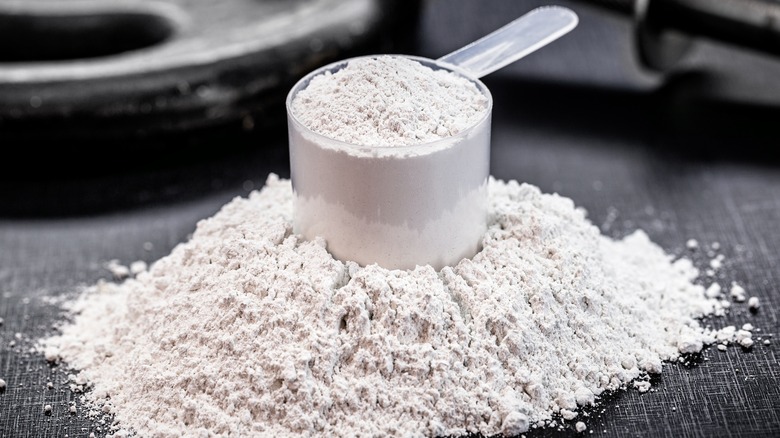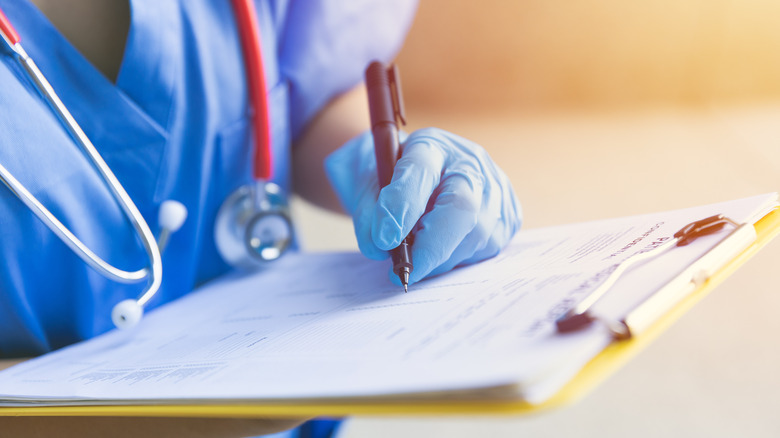What It Means When Your Creatinine Is High
Creatinine is a waste product generated from the normal breakdown of muscle tissues (via WebMD). The body filters this waste product through the kidneys and expels it in urine. According to the National Kidney Foundation, creatinine in your bloodstream differs from that in your urine. The former is called serum creatinine, and the latter goes by creatinine clearance. The creatinine "clearance rate" — a term used by health experts — measures your kidney's ability to handle creatinine. The result determines the speed at which blood moves through your kidneys, often known as the glomerular filtration rate (via WebMD).
According to the Cleveland Clinic, the creatinine clearance test is normally two parts and involves collecting urine over 24 hours before blood is drawn. The normal creatinine level depends on age, gender, body size, and race (via the National Kidney Foundation). According to the Mayo Clinic, the usual reference range for serum creatinine to be 0.74 to 1.35 mg/dL for adult men and 0.59 to 1.04 mg/dL for adult women. If your serum creatinine levels fall above this range, various health implications might exist. Here are the causes and symptoms associated with high creatinine test results.
The causes of high creatinine levels
According to Healthline, various factors can increase creatinine levels. They include poor hydration and taking large amounts of protein or creatine supplements. Per the source, high creatinine can also stem from drug toxicity, and the major culprits include diuretics, antibiotics, chemotherapy, or cardiovascular drugs.
According to MedicalNewsToday, high-intensity exercises can also increase certain blood biomarkers, including creatinine. Other underlying health conditions linked to abnormally high creatinine levels include diabetes, high blood pressure, and heart disease (via MedicalNewsToday). High creatinine levels might also signify kindly failure, according to the Cleveland Clinic. Usually, the glomerular filtration rate (GFR) can determine how well your kidneys are working, per the source.
Before taking a test, it's important to let your doctor know if you're on any medications or have any health and exercise habits that can cause your creatinine levels to increase. The Mayo Clinic also advises avoiding eating meat and stopping creatinine supplements before a creatinine test, since they can interfere with results.
Symptoms associated with high creatinine levels
According to a 2020 case report published in the journal Cureus, the exact effect of creatinine levels on human physiology has yet to completely understand. More so, people with high creatinine levels experience different symptoms depending on the specific causes, per MedicalNewsToday. According to the source, if your medications are causing high creatinine levels, you might experience fluid retention, shortness of breath, chest pains, and confusion. Similar symptoms are also felt when high creatinine levels are associated with heart disease, per the source. However, people with heart disease might also experience trouble speaking or paralysis, which are common symptoms of stroke.
If the cause is diabetes, the most common symptoms include increased thirst and appetite, blurry vision, slow-healing wounds, and a numb or tingling sensation in the hands and feet (via MedicalNewsToday). People with an underlying condition like glomerulonephritis also experience unique symptoms like fluid retention in the face, hands, and feet (via Healthline). They might also notice foaming in their urine due or urine discoloration. According to Healthline, many people with high blood pressure often experience no symptoms. Therefore, the situation might not change if the condition comes with elevated creatinine levels.



